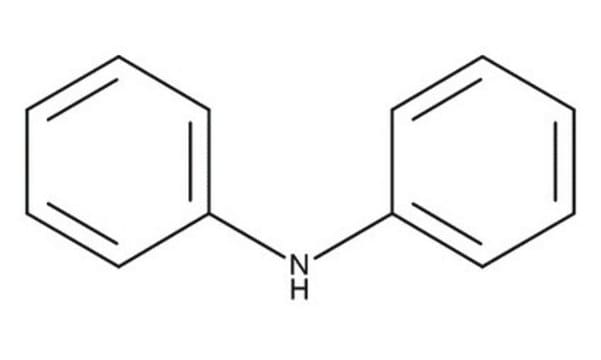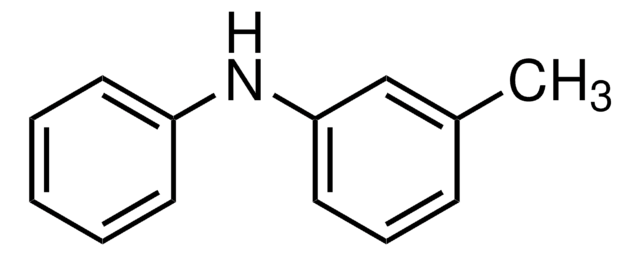CRM69121
Diphenylamin
certified reference material, TraceCERT®, Manufactured by: Sigma-Aldrich Production GmbH, Switzerland
About This Item
Empfohlene Produkte
Qualität
certified reference material
TraceCERT®
Qualitätsniveau
Dampfdichte
5.82 (vs air)
Dampfdruck
1 mmHg ( 108 °C)
Produktlinie
TraceCERT®
Selbstzündungstemp.
1175 °F
Haltbarkeit
limited shelf life, expiry date on the label
Hersteller/Markenname
Manufactured by: Sigma-Aldrich Production GmbH, Switzerland
bp
302 °C (lit.)
mp (Schmelzpunkt)
50-53 °C (lit.)
Format
neat
SMILES String
N(c1ccccc1)c2ccccc2
InChI
1S/C12H11N/c1-3-7-11(8-4-1)13-12-9-5-2-6-10-12/h1-10,13H
InChIKey
DMBHHRLKUKUOEG-UHFFFAOYSA-N
Suchen Sie nach ähnlichen Produkten? Aufrufen Leitfaden zum Produktvergleich
Allgemeine Beschreibung
Certified content by quantitative NMR incl. uncertainty and expiry date are given on the certificate.
Download your certificate at: http://www.sigma-aldrich.com
Diphenylamine is a fat-soluble organic antioxidant, widely used to control post-harvest skin scalding in apples and pears by preventing the oxidation of α-farnesene.
According to the Commission Implementing Regulation (EU) No 578/2012 of 29th June 2012, diphenylamine is not approved for use in the European Union (EU) as an active substance in the plant protection products, following the Regulation (EC) No. 1107/2009. But a default maximum residue limit of 0.05 mg/kg is allowed for its presence in the products of plant and animal origin as per the EU Reg. 2018/1515.
Anwendung
Diphenylamine CRM may also be used as given below:
- Development and validation of a gas chromatography-mass spectrometry (GC-MS) method for the simultaneous analysis of diphenylamine, tolylfluanid, propargite, and phosalone in human liver samples
- Determination of diphenylamine residues in fruit samples after applying a combination of supercritical fluid extraction (SFE) and supramolecular solvent-based microextraction (SSME) for the extraction, followed by a determination using high-performance liquid chromatography (HPLC) with ultraviolet (UV) detection
- Evaluate a newly designed molecularly imprinted polymer (MIP) based on β-cyclodextrin (β -CD) and graphene oxide (GO) for the determination of diphenylamine
- Analysis of diphenylamine in apple samples using an electrochemical sensor based on phosphomolybdic acid (PMo12) and graphene oxide (GO)
- Investigate the performance of an electrochemical sensor founded upon polymeric carbon-rich graphitic carbon nitride (C-gCN) to detect diphenylamine in apple juice samples
- Study the determination of diphenylamine in apple and pear samples using an electrochemical sensor based on Copper@nanoporous carbon (Cu@NPC) as the electrode material
Sonstige Hinweise
The collision cross section (CCS) measurement was provided by Waters Corporation, using the SYNAPT XS mass spectrometer.
For a description and overview of how ion mobility enables the measurement of the CCS of an ion visit ims.waters.com.
Further information on the SYNAPT XS mass spectrometer can be found on the IMS microsite and product webpage.
TWCCS measurements are expected to be within 2% of this reference value.
P/N CRM69121 is part of the Waters Extractables & Leachables UNIFI scientific library which can be downloaded from Waters Marketplace.
Empfohlene Produkte
Rechtliche Hinweise
Signalwort
Danger
H-Sätze
Gefahreneinstufungen
Acute Tox. 3 Dermal - Acute Tox. 3 Inhalation - Acute Tox. 3 Oral - Aquatic Acute 1 - Aquatic Chronic 1 - STOT RE 2
Zielorgane
Kidney,Liver,spleen
Lagerklassenschlüssel
6.1C - Combustible acute toxic Cat.3 / toxic compounds or compounds which causing chronic effects
WGK
WGK 3
Hier finden Sie alle aktuellen Versionen:
Analysenzertifikate (COA)
Die passende Version wird nicht angezeigt?
Wenn Sie eine bestimmte Version benötigen, können Sie anhand der Lot- oder Chargennummer nach einem spezifischen Zertifikat suchen.
Besitzen Sie dieses Produkt bereits?
In der Dokumentenbibliothek finden Sie die Dokumentation zu den Produkten, die Sie kürzlich erworben haben.
Unser Team von Wissenschaftlern verfügt über Erfahrung in allen Forschungsbereichen einschließlich Life Science, Materialwissenschaften, chemischer Synthese, Chromatographie, Analytik und vielen mehr..
Setzen Sie sich mit dem technischen Dienst in Verbindung.







